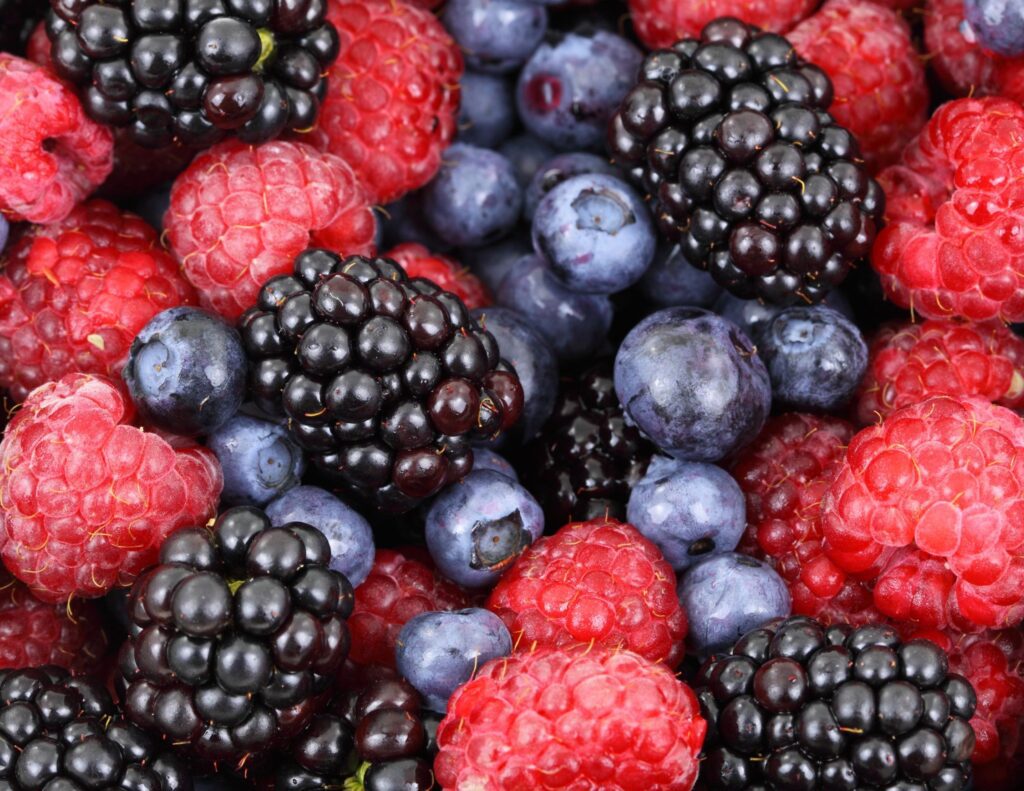What are the Benefits of Eating Superfoods
In the pursuit of a healthy and balanced diet, incorporating superfoods can be a game-changer. Packed with essential nutrients, antioxidants, and health benefits, these 50 superfoods are nature’s powerhouse. From fruits and vegetables to nuts and seeds.
Let’s explore the top superfoods that can elevate your well-being and contribute to a vibrant, energized lifestyle.
Blueberries:
These tiny berries are rich in antioxidants, particularly anthocyanins, which have been linked to numerous health benefits, including improved cognitive function and heart health.
Spinach:
Loaded with vitamins A, C, and K, as well as iron and folate, spinach is a leafy green that supports bone health and boosts the immune system.
Quinoa:
A complete protein source, quinoa contains all nine essential amino acids, making it an excellent choice for vegetarians and vegans.
Avocado:
Packed with healthy monounsaturated fats, avocados are not only delicious but also beneficial for heart health and weight management.
Salmon:
A great source of omega-3 fatty acids, salmon supports brain health, reduces inflammation, and promotes cardiovascular well-being.
Chia Seeds:
These tiny seeds are rich in fiber, omega-3 fatty acids, and antioxidants, providing a nutritional boost to your diet.
Sweet Potatoes:
Loaded with vitamins and minerals, sweet potatoes are a nutritious carbohydrate option that supports vision, immunity, and skin health.
Broccoli:
Rich in fiber, vitamins C and K, and folate, broccoli is a cruciferous vegetable known for its cancer-fighting properties.
Turmeric:
The active compound in turmeric, curcumin, has potent anti-inflammatory and antioxidant effects, contributing to overall health.
Greek Yogurt:
A protein-rich dairy option, Greek yogurt supports gut health, aids in digestion, and provides a satisfying snack.
Kale:
This nutrient-dense leafy green is high in vitamins A, C, and K, as well as minerals like iron and calcium.
Almonds:
A good source of healthy fats, fiber, and protein, almonds contribute to heart health and may aid in weight management.
Garlic:
Known for its immune-boosting properties, garlic also has anti-inflammatory and antimicrobial benefits.
Beets:
Packed with antioxidants and nitrates, beets support heart health and may enhance exercise performance.
Walnuts:
Rich in omega-3 fatty acids, walnuts promote brain health and have been associated with reduced inflammation.
Dark Chocolate:
In moderation, dark chocolate with high cocoa content provides antioxidants and may have heart-protective benefits.
Oranges:
An excellent source of vitamin C, oranges support immune function and skin health.
Lentils:
High in protein, fiber, and various vitamins and minerals, lentils are a nutritious and versatile legume.
Ginger:
Known for its anti-inflammatory and digestive properties, ginger adds flavor and health benefits to your meals.
Cinnamon:
This spice has antioxidant and anti-inflammatory effects and may help regulate blood sugar levels.
Pineapple:
Rich in vitamin C and manganese, pineapple supports immune function and bone health.
Olive Oil:
A key component of the Mediterranean diet, olive oil is high in monounsaturated fats and antioxidants.
Pumpkin Seeds:
Packed with magnesium, zinc, and antioxidants, pumpkin seeds contribute to heart health and immunity.
Brussels Sprouts:
These cruciferous vegetables are rich in fiber, vitamins, and antioxidants.
Mango:
High in vitamin C and vitamin A, mangoes provide immune support and promote eye health.
Green Tea:
Loaded with antioxidants, green tea has been associated with various health benefits, including improved brain function.
Asparagus:
A good source of fiber, vitamins, and minerals, asparagus supports digestion and may have anti-inflammatory effects.
Pomegranate:
Rich in antioxidants, pomegranate has been linked to heart health and may have anti-cancer properties.
Eggs:
A complete protein source, eggs are also rich in vitamins and minerals, including choline, important for brain health.
Black Beans:
High in fiber and protein, black beans are a nutritious addition to a balanced diet.
Carrots:
Packed with beta-carotene, carrots support eye health and immune function.
Flaxseeds:
A rich source of omega-3 fatty acids and fiber, flaxseeds have heart-healthy benefits.
Kiwi:
High in vitamin C and fiber, kiwi supports immune function and digestive health.
Edamame:
These young soybeans are a good source of plant-based protein and essential nutrients.
Cauliflower:
Low in calories and high in vitamins, cauliflower is a versatile vegetable with various health benefits.
Beetroots:
Rich in antioxidants and nitrates, beetroots support cardiovascular health and athletic performance.
Brazil Nuts:
High in selenium, brazil nuts support thyroid function and have antioxidant properties.
Cranberries:
Known for their anti-inflammatory and urinary tract health benefits, cranberries are rich in antioxidants.
Figs:
Packed with fiber, vitamins, and minerals, figs support digestive health and provide sustained energy.
Sunflower Seeds:Superfoods
High in vitamin E and magnesium, sunflower seeds contribute to heart health and muscle function.
Watermelon:
Hydrating and rich in antioxidants, watermelon supports skin health and provides essential vitamins.
Oats:
A good source of fiber and nutrients, oats support heart health and provide sustained energy.
Artichokes:
Rich in fiber and antioxidants, artichokes support digestive health and liver function.
Swiss Chard:
A nutrient-dense leafy green, Swiss chard is high in vitamins, minerals, and antioxidants.
Cottage Cheese:
A protein-rich dairy option, cottage cheese supports muscle repair and satiety.
Papaya:
Rich in enzymes, vitamins, and antioxidants, papaya supports digestion and skin health.
Barley:
A whole grain high in fiber and nutrients, barley supports heart health and regulates blood sugar.
Mushrooms:
Packed with vitamins, minerals, and antioxidants, mushrooms support immune function and may have anti-cancer properties.
Green Peas:
High in fiber, protein, and various vitamins, green peas are a nutritious addition to any diet.
Incorporating these 50 superfoods into your diet can provide a wide array of nutrients, antioxidants, and health benefits.
Remember to maintain a balanced and varied diet to ensure you receive the full spectrum of essential nutrients for optimal well-being.
Whether you’re looking to boost your immune system, support heart health, or enhance cognitive function, these superfoods offer a delicious and nutritious way to nourish your body and promote a healthier lifestyle.
What are the benefits of eating Superfoods
Eating a variety of the top 50 superfoods can offer a multitude of health benefits, contributing to overall well-being. Here are four key advantages:
Nutrient Density:
The top 50 superfoods are rich in essential nutrients such as vitamins, minerals, antioxidants, and fiber. Consuming nutrient-dense foods supports the body’s various functions, including immune function, energy production, and tissue repair.
These foods provide a wide range of vital nutrients that promote optimal health and can help prevent nutrient deficiencies.
Heart Health:
Many superfoods on the list, such as salmon, olive oil, nuts, and berries, have been associated with cardiovascular benefits. Omega-3 fatty acids in salmon and nuts contribute to heart health by reducing inflammation and improving cholesterol levels.
Olive oil, a staple of the Mediterranean diet, has been linked to lower rates of heart disease. The antioxidants in berries may also play a role in supporting heart function.
Anti-Inflammatory Properties:
Several superfoods, including turmeric, ginger, dark leafy greens, and berries, possess anti-inflammatory properties. Chronic inflammation is linked to various health issues, including heart disease, arthritis, and certain cancers.
Consuming foods with anti-inflammatory compounds helps the body combat inflammation and may contribute to a reduced risk of chronic diseases.
Weight Management and Satiety: superfoods
Many superfoods, such as quinoa, chia seeds, and lean proteins like eggs and Greek yogurt, are rich in protein and fiber. These nutrients promote satiety, helping to control appetite and prevent overeating.
Additionally, the combination of protein and fiber supports stable blood sugar levels, which is crucial for weight management and reducing the risk of type 2 diabetes.
Incorporating a diverse array of these superfoods into your diet not only enhances the flavor and variety of your meals but also provides a comprehensive spectrum of nutrients that work synergistically to promote health and vitality.
It’s important to note that while superfoods offer numerous benefits, a balanced and varied diet, along with a healthy lifestyle, is key to achieving and maintaining overall well-being.

































